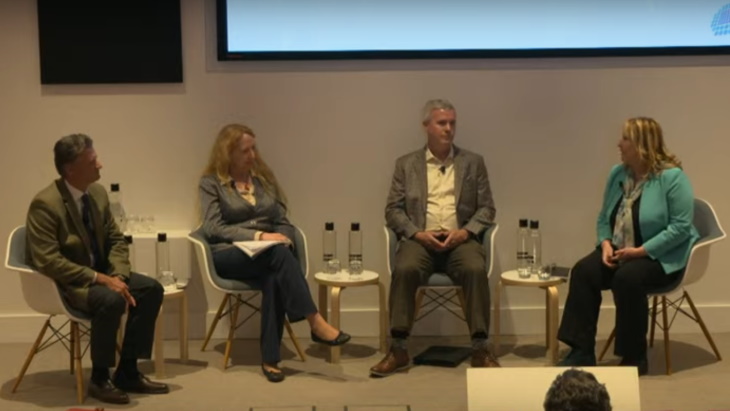A session on Government and Utility Views on Energy and Supply Security included an EU perspective from Foratom Director General Yves Desbazeille. Adrienne Hanly, uranium production specialist in the International Atomic Energy Agency (IAEA) Department of Nuclear Energy gave an overview on uranium inventories, focusing on a forthcoming IAEA technical document, while a utility perspective was provided by Jason Murphy, vice president of nuclear fuels at Constellation.
The session was moderated by Luminita Grancea, nuclear energy analyst at the OECD-Nuclear Energy Agency, who asked the panellists their recommendations to policymakers and to industry to ensure security of supply.
From a European perspective, Desbazeille said, policymakers should adopt a more pragmatic approach to energy security, particularly when it comes to EU policy on nuclear. Prolonging the operating life of the existing nuclear fleet is a "no-regret" solution that is cheap and available now, he said: "It's only a case of [making] a decision and forgetting about ideology."
Although some countries are beginning to adopt a pragmatic approach, this is not yet being seen at the EU or European Commission level, he said. "The change-of-mind we can observe is a more 'bottom-up' thing - in some countries, we see that public opinion tends to shift to a more positive view on nuclear and the role it can play," he said, adding that from the governmental side, the situation is not so straightforward. For Germany, although it would clearly be possible to keep the country's remaining nuclear plants open, very strong political opposition to this means "the debate is already over".
In Belgium, the decision to prolong the operating lives of two of the country's seven reactors illustrates a slight shift from the country's green-led coalition government, he said. "73% of [Belgian] citizens are now supportive of the idea of prolonging the whole fleet, so we see a definite clash between the political level and the public itself," he said.
New perspective on inventories
Hanly outlined an ongoing project to produce an IAEA Technical Document on Global Secondary Uranium Inventories. Secondary uranium supplies are defined as all materials other than primary production which is sourced to satisfy nuclear reactor requirements. Such supplies currently and historically fill the gap in demand not filled by primary uranium production and understanding the role of secondary inventories is therefore important in ensuring the assurance of nuclear supply.
The IAEA-coordinated project is focusing on front-end inventories - commercial inventories in the form of natural uranium ore concentrates, natural uranium hexafluoride, enriched uranium product and unused fuel assemblies - in the world's eight largest nuclear fuel markets, with quantitative analysis based on publicly available information together with qualitative analysis from experts. This approach, said Hanly, could fill some important gaps in analysis and support assessments due to its non-commercial nature.
Analysis of data supplied by the Euratom Supply Agency (ESA) shows that 42,400 tUe (tonnes of uranium equivalent) of declared inventory was held by European utilities in 2020. Ten utilities held inventories of less than 1500 tUe, while seven held inventories ranging from 1500 tUe to over 6000 tUe (an upper limit is not given to protect confidentiality). While this on aggregate equates to ESA's recommended two-years' worth of supply, many individual utilities fall short of this benchmark.
A similar exercise using data from the US Energy Information Administration revealed a similar pattern, with an average inventory per utility of about 1300 tUe, concentrated in about 40% of utilities. This equates to about 23,564 tUe of "buffer stocks" - or about 16 months' worth of supply - available to mitigate supply disruptions.
"A preliminary conclusion is that US utilities may have limited capability to independently manage a protracted supply disruption," Hanly said. Strategic inventories held by US DOE including American Assured Fuel Reserve and MOX backup offer a "potential short-term backstop", she added.
In answer to questions on what could be done to ensure security of supply, Hanly called for more transparency in reporting inventories, as well as supporting diversity in primary supply. "As an industry - and maybe even the IAEA - we should be making recommendations on best practices [for inventories] … we should be able to demonstrate that there is an assurance of supply" beyond fuel banks which are for emergency situations, she said.
The IAEA report is expected to be published in early to mid-2023.
Managing risks
Two of Constellation's nuclear plants - Byron and Dresden - last year were on the cusp of early permanent closure until state support to ensure their operation was secured, a situation described by Murphy as a "near-death experience".
Now, with "some uplift" in the market in part due to such state support but also macroeconomic changes, the company is looking to extend the operating licences for its plants to 80 years, he said.
Turning to security of supply, Murphy identified two areas for utilities to manage: operational risk, including ensuring reliable fuel supplies, and financial risk. Ensuring supplier diversity - geographically and also ensuring a diversity of supplier companies - and appropriate inventory holdings to protect against supply disruptions and price shocks offer ways of managing nuclear fuel supply risk. US utilities historically may have maintained lower inventory levels than European or Asian utilities, and that thinking might change going forward, he said. A number of financial strategies on contracting side can help to manage financial risk.
Such strategy decisions should be made calmly and rationally, he said. "As an end user, you have to take long view and try to resist the - very human - urge to take immediate action. Sometimes, doing nothing is a strategy … don't make any rash decisions in the moment."
The top-level international forum, which is co-organised by the Nuclear Energy Institute and World Nuclear Association, was being held in-person for the first time since 2019.





_23009.jpg)

_33392.jpg)
_53504.jpg)






